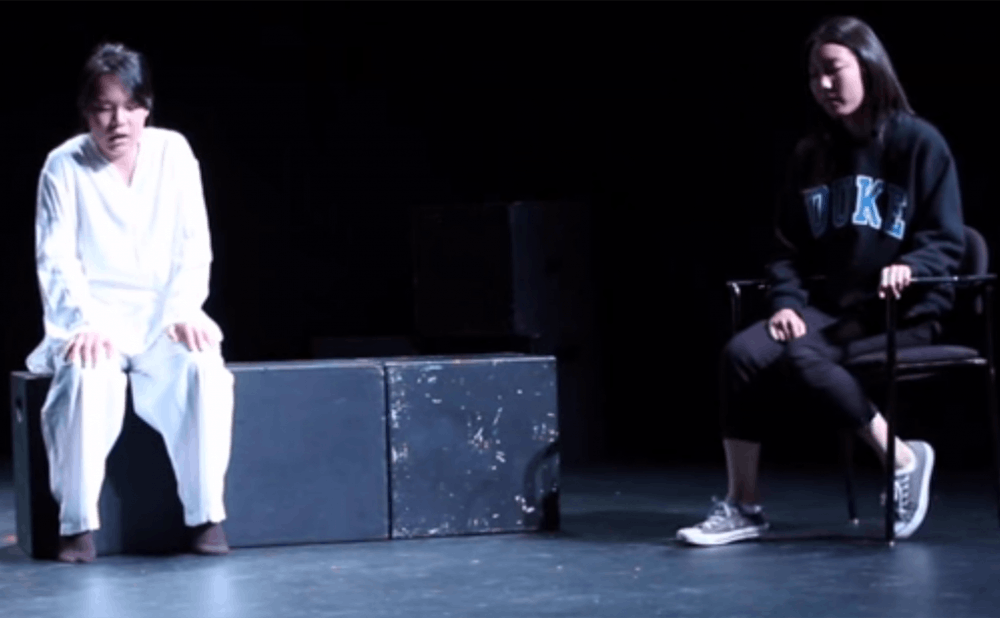A typical theater production starts with several days of tryouts, followed by weeks—sometimes even months—of rehearsal that culminates in a high-stress “tech week” and, finally, the production itself. Eschewing the drawn-out process, the Duke Asian American Theater group’s show Sept. 27 took less than 24 hours to produce and perform.
All production team members—including writers, actors and directors—met with producer Harmony Zhang, a senior, starting at 10 p.m. Sunday, Sept. 26 to discuss their task for the next 24 hours. The actors and directors then went back to their dorm rooms to catch a few hours of sleep while writers Danica Liu and Kara Post, both seniors toiled through the night on their scripts.
“It's not super hard [to write in the early hours of the morning],” senior Danica Liu said. “Actually, when you are tired enough, all of your inhibitions go away and you stop being afraid to write something terrible. And when that fear isn't there anymore, you can do a lot of cool things.”
From the hours of 12 p.m. to 6:30 a.m., Liu and Post produced their uninhibited writing. When the actors arrived at 8 a.m., two scripts entitled "Williams" and "Fourth Wave Feminism" were waiting for them.
By 11 a.m., actors were on their feet, well-acquainted with the plays and finished with preliminary blocking. Over the next nine hours, they developed their characters and memorized their lines. Sophomore Hannah Wang had a particularly difficult task, as she was in every scene of "Williams," said:
“When you have so little time to critically analyze the script, it's harder to get really cerebral or intellectual with your character development," Wang said. "You have to rely much more on your gut, and connect on a visceral, emotional level with your character, letting yourself feel, think and act like them in the moment.”
By 8 p.m., Sheafer Theater was open and ready for an audience. "Williams" told the story of Lucy, a Duke student who is admitted to a psychiatric ward after attempting suicide. At the play's beginning, Lucy is irresponsive and claims that she doesn't need help, but as the show goes on, she begins to find companions in her fellow ward-mates. The play culminates in the revelation that Lucy tried to commit suicide after coming out as a lesbian by kissing her best friend, who subsequently rejected her. At the end of the play, Lucy is released from the ward, though her future plans are unclear.
In contrast to the tense and tragic "Williams," Post’s play "Fourth Wave Feminism" was a satire using humor to expose hyperbolic and inaccurate stereotypes about feminists.
“The play started with the idea of playing off the extreme [stereotypes] that feminists are a threat to everything traditionally American,” Kara says. “They are communists… terrible wives and mothers, lesbians—which seems like an antiquated idea, but some people really did view suffragists as an evil.”
Director Aileen Bi, a senior, and actors Sophie Caplin, a sophomore, and Ruici Ong, a senior, brought Post's vision to life. At the start of the play, feminist activist Isabella converts her fellow student Audrey to feminism, and over time, Audrey’s views about women’s rights become increasingly extreme. By the end of the show, she is an anti-capitalist, lesbian, male-hating witch. In one of the final scenes, she literally brews a potion as convenient “thunder” lighting effects burst in the background.
“The whole experience of arriving at 8 a.m. to the performance at 8 p.m. was crazy and memorable," Ong said. "I certainly recommend the 24-hour play experience to any student who wants quick and dirty, short-term yet intense and rewarding experience in theater.”
Zhang predicts that Duke Asian American Theater will put on the fourth annual 24-Hour Play next year.
“What inspires us to put it on every year, more than anything, is to see students take up the challenge of working together, pushing their limits, and creating something really memorable at the end," she said.
Get The Chronicle straight to your inbox
Sign up for our weekly newsletter. Cancel at any time.

